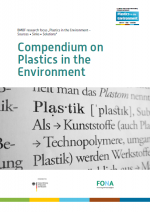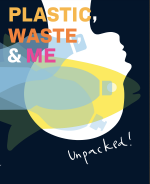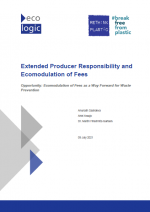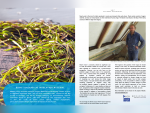Ecologic Institute Newsletter No 228 – September 2021
- Ecologic Institute Newsletter

Our Current Research on Sustainable Resource Use
Dear Readers,
Resource use is increasing globally – since 1970, global extraction of biomass, fossil fuels, industry minerals and metals has almost quadrupled. At the same time, per capita resource use is on the rise, most significantly in countries of the Global North. In order to use natural resources sustainably and within the planetary boundaries for generations to come, resource conservation and a circular economy need our attention. At Ecologic Institute, we therefore join scientific research forces from different angles. We place one focus on Resource Conservation and Circular Economy in general, and an additional one on Plastics in particular. Some important aspects and results of our work are presented in this newsletter edition:
In the field of Resource Conservation and Circular Economy we explore in a scientific article the perspectives on climate-resource-nexus policies, analysing potential interactions between climate and resource policy in different world regions. Scientific studies mostly address greenhouse gas emission reduction potentials of resource efficiency approaches, e.g. lifetime extension, material substitution, and recycling. Findings from interviews reveal that climate and resource policy measures will have to differ between regions to improve relevance and fit, and that silo culture may prevent an integrated climate-resource-nexus perspective. We also look at the ecomodulation of fees as a way forward for waste prevention, taking a closer look at the possibilities the extended producer responsibility (EPR) could have. The analysis shows that a systemic change in both, the EPR and the ecomodulation of fees is required in a way focusing more on waste prevention measures. At the EU level, the textile value chain is currently in the focus of efforts to build a circular economy. Though textile recycling in the EU is still in its infancy, promising innovative technologies are entering the market. We shed light on how and which policies can support the industrial uptake of textile recycling.
In the field of Plastics, we were part of a large inter- and also transdisciplinary group of scientists to gather a comprehensive compendium compiling the most important terms around plastics in the environment. Terms and definitions in the technical and regulatory field are very closely linked to specific areas of application. This is why there are sometimes different levels of meaning to a term. The objective of this handbook is to contribute to a common understanding of the numerous relevant terms. Furthermore, we also contributed from a scientific point of view the facts and figures to the non-fiction youth book "Plastik, Müll und Ich".
Happy reading,
Doris Knoblauch and Dr. Martin Hirschnitz-Garbers
Exploring Perspectives on Climate-resource-nexus Policies – Article
Natural resource extraction and processing accounted for 23% of global greenhouse gas emissions in 2015. Therefore, reducing resource use through resource efficiency promises significant contributions to climate protection. This "climate-resource-nexus" has mostly been explored from a scientific, Global North-oriented perspective. In this article, researchers from the Ecologic Institute analyze the potential interactions between climate and resource policy in different world regions. They did not find a generic climate-resource-nexus policy. The article is available online.
Plastics in the Environment – Compendium
This compendium aims to sharpen relevant terms and thereby aims to contribute to the heterogeneity of the scientific community on "plastics in the environment". In addition, the brochure is intended to help ensuring that communication with and by non-scientific actors on the topic is based on a terminologically correct foundation, especially in emotionally charged debates. After all, these debates are often highly relevant in shaping our future, and it seems important that the necessary political, social and economic decisions should be taken on the basis of knowledge and factual information. This compendium, published and edited by Ecologic Institute, is available for download.
Plastic, Litter and Me – Book
The Heinrich Böll Foundation, the book designer Gesine Grotrian and the Ecologic Institute as expert support have worked closely with young people to develop a book for people aged 12 and over that describes the history, production and risks of our plastic consumption in a straightforward, colorful and easy-to-understand way. It also shows alternatives and ways out of dealing with plastic and its dangers. The book is available online.
Extended Producer Responsibility and Ecomodulation of Fees – Analysis
In this analysis, the authors of the Ecologic Institute focused on product streams: plastic/packaging, waste electric and electronic equipment, batteries and textiles. They investigate the four cross-sectional aspects: modulation criteria, size of the fees, cost coverage and revenue use. The results suggests a systemic change in the Extended Producer Responsibility and ecomodulation of fees is required which is more focused on waste prevention measures. The analysis is available for download.
Phasing out Fossil Fuel Subsidies – Discussion Paper
Fossil fuels are heavily subsidized in the EU. In 2018, for example, fossil fuel subsidies in the EU amounted to 50 billion Euro. Regardless of its climate commitments, the EU has continuously failed to phase out fossil fuels. Ending fossil fuels has been one of the most protracted and deadlocked issues of EU climate and energy policies. The Conference on the Future of Europe could give new momentum to this deadlocked debate. This paper by Ecologic Institute presents arguments and options for action. The recommendations are available for download.
High-quality Textile Recycling as Part of a Circular Textile Economy – Webinar
In EU policy, the textile value chain is currently in the focus of efforts to build a circular economy. Textile recycling in the EU is still in its infancy, although promising innovative technologies are about to enter the market. How can policy support the industrial uptake of textile recycling? This was topic of a webinar held on 31 August 2021. Members of Ecologic Institute's Circular Economy Team presented policy recommendations to the European Commission to enhance systems for the collection, sorting and recycling of textile waste – and to create a market for recycled textiles. The presentation slides are available for download.
Using Seagrass as Insulation Material – Article
This article gives an example of how to use seagrass in a sustainable way. "Using Seagrass as Insulation Material" by Dr. Nico Stelljes is published in the "Baltic Stories Magazine" that is devoted to promoting cooperation around the Baltic Sea, joint initiatives and projects of the European Union Strategy for the Baltic Sea Region (EUSBSR). The article is available online.
ElectricityNeighbours – Prospects for Dynamic Tenant Electricity Expansion in Berlin – Discussion
The Berlin Energy and Climate Protection Program 2030 gives solar energy a central role, as it is the most important renewable energy source that can be developed locally. The state government wants to cover 25 percent of Berlin's electricity supply from solar energy as quickly as possible. In the densely populated city, this also requires the roofs of apartment buildings to be used. In the discussion format Wandelwecker on 8 September 2021, Fabian Zuber (Reiner Lemoine Foundation) and Ecologic Institute's Katharina Umpfenbach discussed the options available to transform the regulation of tenant electricity and local solar power supply. The event was moderated by Valentin Tappeser (IÖW). It became clear that solar expansion can only be achieved at the required speed with a fundamentally new regulatory approach centered around joint self-supply that intelligently links on-site power generation via solar systems with charging of electric vehicles and heat generation. The discussion can be listened to online.
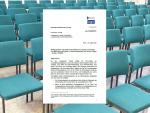
Hessian State Draft Climate Change Act – Hearing
On 1 September 2021, Dr. Stephan Sina, Senior Fellow at Ecologic Institute, participated as an expert in a hearing of the Hessian State Parliament's Committee for Environment, Climate Protection, Agriculture and Consumer Protection on the draft of the SPD parliamentary group for a law to protect people and nature from climate change and its consequences. Together with twelve associations and experts, he commented on the draft law and answered questions from members of parliament. The written statement of Dr. Stephan Sina is available for download.
Rights of Nature: Legal Perspectives from America and its Implications in International Environmental Law – Presentation
In this presentation, Ecologic Institute's International Climate Protection Fellow Mario Alejandro Delgado Galarraga reviews whether the evolution of Rights of Nature in America has influenced International Environmental Law, especially at a regional level. It appraises and contrasts national legal conducts with the Inter-American Court of Human Rights' Advisory Opinion "OC-23/17" (Environment and Human Rights). Thus, it centers on Comparative Law and International Environmental Law. The presentation was held during the IUCN World Conservation Congress 2021 and is available online.
Researcher / Fellow with Focus on Food Systems
To support our team in Berlin, we are looking for a Researcher / Fellow with a focus on food systems. Ecologic Institute conducts research at national and European level on ideas, concepts and policy recommendations for sustainable food systems. Our research focuses on the reduction of food waste, measures for a protein shift, the importance of regionalization of food systems and the governance of food policy and food system transformation. To expand and support this work, we are looking for a competent and committed new team member!
Student Assistant in Water Policy / Integrated Water Resources Management
As Student Assistant in Water Policy / Integrated Water Resources Management, you will support our Water Resources Management Team in research work, preparing reports and communication tasks within national and international projects. We are looking forward to your application!
Contents
- Sustainable Resource Use
- Exploring Perspectives on Climate-resource-nexus Policies – Article
- Plastics in the Environment – Compendium
- Plastic, Litter and Me – Book
- Extended Producer Responsibility and Ecomodulation of Fees – Analysis
- Phasing out Fossil Fuel Subsidies – Discussion Paper
- High-quality Textile Recycling as Part of a Circular Textile Economy – Webinar
- Using Seagrass as Insulation Material – Article
- ElectricityNeighbours – Prospects for Dynamic Tenant Electricity Expansion in Berlin – Discussion
- Environmental Law
- Hessian State Draft Climate Change Act – Hearing
- Rights of Nature: Legal Perspectives from America and its Implications in International Environmental Law – Presentation
- We are Hiring!
- Researcher / Fellow with Focus on Food Systems
- Student Assistant in Water Policy / Integrated Water Resources Management
